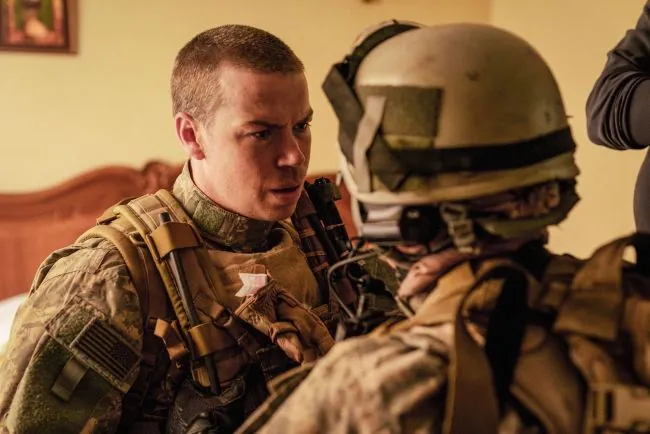
Warfare Review: Alex Garland’s Gritty Iraq War Simulator Strikes a Chord with Unfiltered Realism
2025-03-28
Author: Liam
Warfare Review: Alex Garland’s Gritty Iraq War Simulator Strikes a Chord with Unfiltered Realism
The latest offering from director Alex Garland, titled “Warfare,” presents a tightly crafted exploration of a Navy SEALs mission gone awry in Ramadi during the Iraq War in 2006. Following up on his previous project, “Civil War,” which tackled the collapse of democracy through a speculative lens, “Warfare” dives headfirst into the visceral and often brutal realities of modern combat—stripped of glamour and laden with the weight of memory.
“Warfare” serves as a stark reminder of the human costs behind the banners of American exceptionalism, a term that Garland, a British filmmaker, grapples with throughout this gripping narrative. While “Civil War” critiqued the appropriated narratives of political divisions at home, “Warfare” focuses on the experiences of soldiers engaged in far-off battles. It underscores the indifference with which distant wars are often viewed, highlighting the stark contrast between the fantasy of military service and the harsh reality of its consequences.
Documented through the lens of unsparing realism, “Warfare” seeks to immerse the audience in the immediate intricacies of combat without flinching from the ugly truths that come with it. Co-directed by Ray Mendoza, a real-life communications officer and stunt coordinator for “Civil War,” the film captures the essence of what it felt like to be a soldier amid chaos, transforming the screenplay into something more akin to a detailed chronicle than conventional scriptwriting.
Instead of relying heavily on dialogue, the SEAL team’s communication consists of terse exchanges of chatter, while the characters are identifiable solely by their ranks. This creative choice serves to amplify the stark setting devoid of theatrics, where the specter of death lurks at every corner. Garland is not interested in compressing combat into a tidy narrative; instead, he gives the audience an unmediated exploration of tension that simulates the chaos experienced by soldiers.
Interesting to note is the film's commentary on how veteran soldiers face their trauma years later, particularly through the character of Elliot Miller, played by Cosmo Jarvis. The haunting memories are mirrored in the lived experiences of the actors who portray them, reminding viewers of the reality behind the facade.
“Warfare” also doesn’t shy away from portraying the impact of military actions on civilians. The film portrays scenes where Iraqi families face the consequences of displacement and terror, effectively highlighting the collateral damage often overlooked in mainstream narratives. Despite the vivid depiction of combat, Garland also makes a deliberate point to show the pain inflicted upon ordinary families, capturing the prevalent sense of loss pervading both American and Iraqi sides of the conflict.
The film's unflinching realism extends to the fact that it reveals the overwhelming waste of military expenditure and human lives. It reflects on the scale of loss experienced, making poignant comments about the Iraq War’s legacy and the human stories overshadowed by the broader political narrative. While it may appear to celebrate military prowess, it simultaneously critiques the tragic emptiness behind militaristic triumphs.
Some critics may perceive “Warfare” as displaying a disconnect, particularly when the upbeat behind-the-scenes footage rolls during the credits. However, this juxtaposition highlights the delicate balance of filmmaking against the harsh real-world backdrop of warfare—a testament to the resilience of both the soldiers being portrayed and those who stand behind the camera.
In conclusion, while “Warfare” may seem to challenge the boundaries of traditional war films with its staunch focus on realism, it stands as a profound commentary on the costs of war. It compels viewers to engage with the uncomfortable truths that underlie both individual and collective memories of conflict. By the film's end, one cannot help but walk away with a sense of awareness about the sacrifices made far from domestic shores, reminding us that these are the scars that linger long after the battles have been fought.
Grade: B-
A24 will release “Warfare” in theaters on April 11, offering an immersive experience that goes beyond the realm of conventional war movies—inviting you to witness, feel, and reflect.









 Brasil (PT)
Brasil (PT)
 Canada (EN)
Canada (EN)
 Chile (ES)
Chile (ES)
 Česko (CS)
Česko (CS)
 대한민국 (KO)
대한민국 (KO)
 España (ES)
España (ES)
 France (FR)
France (FR)
 Hong Kong (EN)
Hong Kong (EN)
 Italia (IT)
Italia (IT)
 日本 (JA)
日本 (JA)
 Magyarország (HU)
Magyarország (HU)
 Norge (NO)
Norge (NO)
 Polska (PL)
Polska (PL)
 Schweiz (DE)
Schweiz (DE)
 Singapore (EN)
Singapore (EN)
 Sverige (SV)
Sverige (SV)
 Suomi (FI)
Suomi (FI)
 Türkiye (TR)
Türkiye (TR)
 الإمارات العربية المتحدة (AR)
الإمارات العربية المتحدة (AR)